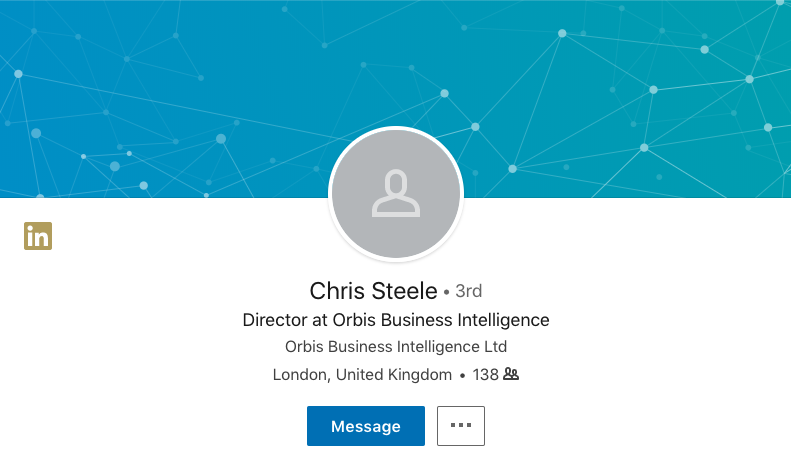Pro Tip: Do not list spy work on your LinkedIn bio

I was complaining to a former defense official recently about a senior spy type who refused to speak with me about a story.
“You’ve got to be like Mueller!” he crowed. “Start at the bottom and roll them up.”
I used LinkedIn to find an introduction. And indeed, the link between reporting and special counsel Robert Mueller’s investigation is true of counter-intelligence and business-to-business marketing as well: Figuring out the bit players and tying them to the big players is the name of the game.
In London, the Telegraph newspaper has linked a spy movie calibre assassination attempt to a secret dossier on the president of the United States, thanks to a consultant who reportedly listed his work for Orbis Business Intelligence on his LinkedIn page.
That consultant—an agent employed by Orbis founder Christopher Steele to gather information—was reportedly in repeated contact with an exiled former Russian intelligence officer, Sergei Skripal, who was poisoned along with his daughter in a brazen public murder attempt on March 4.
Steele, of course, is the author of the famous dossier on Donald Trump’s connections to Russia. It could all be a coincidence, but the Telegraph’s report implies that Skripal, still deeply tied to Russian intelligence, could be a source of some of the claims in that dossier, and was targeted for death because of it. None of the parties commented.
The nature of Skripal’s past and sophistication of the attack, which used a rare nerve agent, suggest that Russia was behind it. The country has denied this, and its embassy to the UK noted on twitter that, as a double-agent leaking secrets to MI6, Skripal was technically a British spy.
The lesson? Actual spies should keep their work off social media. (If you, like me, thought they already did, apparently we are wrong.) Most “business intelligence” firms are full of analysts who specialize in reading newspapers and magazines that business executives don’t have time to read, so they can write memos for the same executives, which they also do not read. Employees of those firms can feel free to network digitally.
But, if your business intelligence work involves meeting former double agents to hoover up info about Russian national security operations, maybe keep a lower profile. Especially if you live in the United Kingdom, which Russia’s intelligence services treat as a kind of a sporting field for targeted murder. (Telling spies to be less obtrusive is against my interests as a reporter, but at Quartz we are not afraid of service journalism, especially for our readers in the cloak and dagger sector.)
Steele himself, or a sufficiently dedicated imposter, maintains a LinkedIn profile, as do several of his colleagues, who may want to take them down.
Sign up for the Quartz Daily Brief, our free daily newsletter with the world’s most important and interesting news.
More stories from Quartz:

 Yahoo Finance
Yahoo Finance 